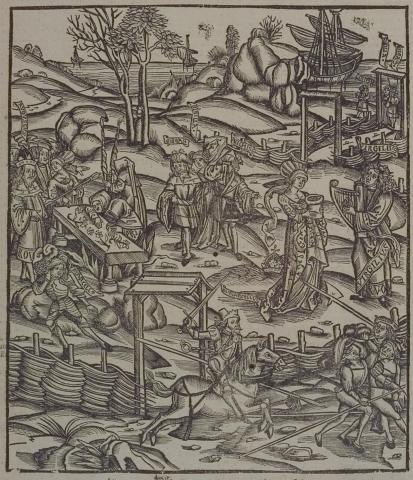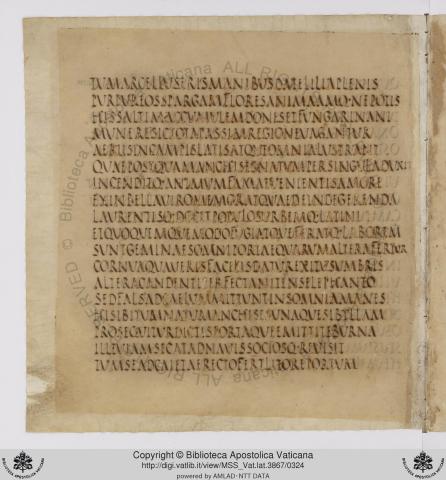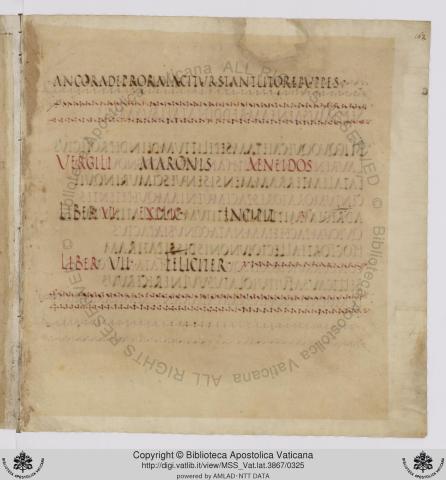CORE VOCABULARY
geminus, a, um: (adj.), twin, 1.274, et al.; twofold, 6.203; double, two, 4.470; pl., geminī, ae, a, twin, 2.500; two, 1.162.
somnus, ī, m.: sleep, slumber, 1.680, et al.; a dream, 1.353; night, 1.470, et al.; personif., Somnus, the god of sleep, 5.838, et al.
corneus, a, um: adj. (cornū), of horn, 6.894.
exitus, ūs, m.: a going or coming out; departure, exit, passage, 6.894; event, 5.523; end, death, 2.554.(exeō)
candeō, uī, 2, n.: to be of pure whiteness; p., candēns, entis, white, 4.61; at white heat; glowing, 3.573; 12.91.
perficiō, fēcī, fectus, 3, a.: to make completely; finish, complete, 6.745; perform, 3.178; p., perfectus, a, um, worked, wrought, executed, 5.267; fulfilled, 3.548. (per and faciō)
nitēns, entis: shining, glittering, sparkling; bright, 1.228; (fig.), sleek, well-fed, 3.20.
elephantus, ī, m.: an elephant; (meton.), ivory, 3.464.
īnsomnium, iī, n.: that which comes in sleep; a dream, 4.9.
Mānēs, ium, m.: the deities of the lower world, 6.896; gods or powers below, 12.646; the spirits or souls of the dead in Hades; ghosts, shades, Manes, 3.63; penalties of the lower world, punishments, expiations, purgatory, 6.743; abode of the dead, 4.387; infernal regions, the world below, 10.820.
Anchīsēs, ae, m.: son of Capys and Themis, and father of Aeneas by Venus, 2.687, et al.
ūnā: (adv.), in one place or at one time, together with, at once, at the same time, 3.634, et al.; with -que following, 11.864.
Sibylla, ae, f.: a prophetess, a sibyl; the Cumaean sibyl, Deiphobe, 3.452, et al.
prōsequor, secūtus sum, 3, dep. a.: to follow on after; follow, pursue, 6.476; attend, 3.130; greet, 11.107; without an object, go on, 2.107.
dictum, ī, n.: a thing said; word, 1.197; command, precept, injunction, 1.695; promise, 8.643. (dīcō)
ēmittō, mīsī, missus, 3, a.: to send forth, 6.898; hurl, throw, shoot, 11.676.
eburnus, a, um: adj. (ebur), of ivory; ivory, 6.647; ivory-hilted, 11.11.
secō, secuī, sectus, 1, a.: to cut, freq.; cut off, 4.704; engrave, carve, 3.464; cut through, cleave, 5.218, et al.; of the channel of a river, 8.63; sail through, pass, 8.96; speed, 6.899; shape out mentally, form, 10.107.
revīsō, 3, a. and n.: to look at again; visit again, return to see; return to, 2.760; revisit, 3.318.
Cāiēta, ae, f.: 1. The nurse of Aeneas, 7.2. 2. A town and haven of Latium, named after the nurse of Aeneas (now Gaëta), 6.900.
portus, ūs, m.: a port, harbor, haven, 1.159, et al; (fig.), 7.598.
ancora, ae, f.: an anchor, 1.169.
prōra, ae, f.: the extreme forward part of a ship; the prow, 1.104.
puppis, is, f.: the hinder part of a ship; the stern, 5.12; (by synecdoche), a vessel, boat, ship, 1.69; (meton.), crew, 8.497.



